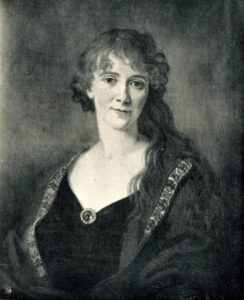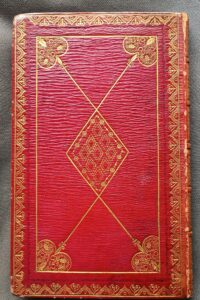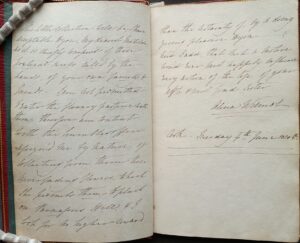
Lives in Verse
Angela Byrne’s research investigates nineteenth-century women’s poetry albums as a form of life-writing.

Portrait of Martha Wilmot, c.1840, public domain, from Wikipedia
I’m working on a collective biography of a group of eighteenth- and nineteenth-century literary and travelling women that emerged from two ‘middling-sort’ Cork families: the Wilmots and the Chetwoods. Martha Wilmot (1775–1873) and her sister Katherine (1773–1824) left rich, lively and entertaining accounts of travels and residences in Napoleonic France, Romanov Russia and imperial Vienna, but other women in their friendship and kinship network also left intriguing records – poetry albums that can enrich our understanding of their lives and experiences.
Benjamin Iveagh purchased two of these poetry albums for his collection in 1983, and they remain in his library in Farmleigh House, now owned by Marsh’s library. They are beautiful objects – red Morocco-covered books with attractive gilt tooling, and good-quality paper that looks and feels satisfying to handle, even after over two centuries.

The back cover of the album compiled by Alicia Wilmot in 1805
The first book was compiled by Alicia Wilmot in 1805 as a gift for her sister Martha, who was then living in Russia as the guest of Princess Ekaterina Romanovna Dashkova. The second book was compiled in 1814 by Eliza Wilmot, née Chetwood – Alicia and Martha’s sister-in-law – as a gift for her mother.
At the time, it was common for literate women to express love and affection for their friends, or mark anniversaries or other occasions, in verse. You made me a present of some ceramic beehives for my breakfast table? I’ll write a poem to thank you. (This is an actual example from Alicia Wilmot’s album.) Touched by the sight of your infant niece sleeping? Compose a few quatrains! Is it the anniversary of the death of a loved one? Then pour your heart out in verse. The poems touch on the concerns of the age, too, including Napoleon and the 1798 rebellion. Their comic epigrams are still funny, and their expressions of loss and love touched me deeply.
But what makes Alicia and Eliza’s compilations special is their intentionality: they specifically selected poems that they thought would be meaningful to the recipient. They went to great efforts to record their own lives and experiences, and those of the women closest to them.
When Eliza Wilmot compiled a book for her own mother, Elizabeth (née Hamilton), in 1814, she left plenty of blank pages, probably hoping that friends and family would make additions. Eliza had long suffered with melancholy and bore her grief heavily after being widowed at the age of forty-five in 1815. After 1822 she filled the blank pages of the 1814 album with her own original compositions on the topics of death, loneliness, insomnia and depression. Her poems rehearse, again and again, her efforts to name her feelings and to ward them off through verse and faith.

Alicia’s dedication to her sister Martha Wilmot in 1805
Even if the style and register would not appeal to modern literary tastes, the poems in these albums are crammed with deeply personal information about the circle of women I’ve been studying. They contain snapshots of the lives of middling-sort women, the daughters and wives of clergymen, administrators and military men – women whose lives, for so long, went unnoticed by history.
Dr Angela Byrne, Royal Irish Academy

Dr Angela Byrne






